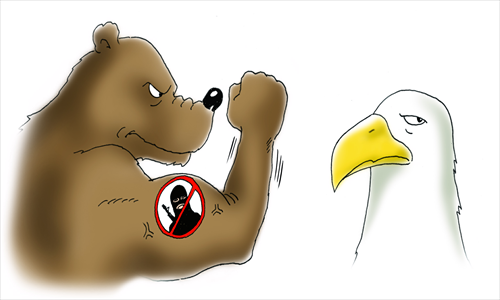Moscow looks for renewed role in Middle East politics

Illustration: Liu Rui/GT
Russia claims that 26 of Kalibr sea-based cruise missiles have successfully destroyed 11 Islamic State (IS) positions. The Russian troops, since September 30, have collaborated with Syrian forces in the air raids against IS in the country. Russia's high-profile involvement in Syria has triggered global attention and controversies.
Syrian Ambassador to Russia Riad Haddad stated earlier that the Kremlin is targeting terrorists, rather than rebels or civilians. About 40 percent of IS facilities have been devastated.
Yet, the Western countries perceive the effects of Moscow's air raids differently. In their view, the Kremlin has mostly aimed at Syrian rebels, instead of the IS, in the first place. Some even conjecture that Russia is backing the violence of Bashar al-Assad's regime. The opposing voices far outweigh the supportive ones and several Western officials have publicly criticized the Kremlin's actions in Syria on different occasions.
Although major powers share the common task of striking IS, they have their own calculations. The current turmoil can be attributed to the big-power games.
Despite the common target to raid the IS, Russia and the US have conflicting stances over Bashar al-Assad's government. While the US-led coalition against the IS insists on the toppling of Assad, Russia aims to safeguard the survival of his regime. Both countries have their respective goals in their involvement in the Middle East, yet cracking down on the IS just serves as a tool to realize these goals.
This time, Moscow has demonstrated its firm and open support for the Assad government. Its high-profile operations have reflected Moscow's capacity to play an important role in international politics even in the situation when the Kremlin is facing multi-layered crises. As Russia's firmest ally in the Middle East, Assad is what Moscow badly needs.
Moreover, the IS itself poses enormous threat to Russia. Even though the IS is under attack from Syria, Iraq and the international community, the number of terrorists has witnessed an increase. The composition of the organization is very complicated, with many of its members from countries once part of the Soviet Union.
Statistics from the Russia's National Anti-Terrorism Committee suggests that more than 800 militants from the North Caucasus have joined the IS, yet the number, in reality, may have far exceeded this figure. These militants are likely to pose security threats to this region.
Levada Center polls suggest that 70 percent of respondents are supportive of Russia's military operations against IS in Syria.
Russian political scientist Sergey Markov has said that Kremlin is actively promoting all-around cooperation to target the IS. Russia is seeking to play a major role in linking up Syria, Iraq and Kurdish military in order to build a Syria-Iraq-Kurd anti-IS alliance, which is different from the Western one. The alliance would exclude the US, France, Saudi Arabia, Turkey, Israel and may seek political and military support from Iran and China in the future.
Putting aside Russian involvement in Syria, the competition between Moscow and Washington has entered into a brand new stage in the Middle East. In the 10 years since the 2003 Iraq War, Russia's traditional partners in the region, Iraq and Libya, have been cleared away by the US. The Assad regime of Syria has also confronted several major crises. Obviously, Russia has been forced into a strategic disadvantage in these years.
Russia, facing multi-layered crises, has still chosen to interfere with the interior affairs of Syria.
This has provided another pattern for interference, namely, intervening into other countries' affairs without endangering the authority of others or the survival of the local regimes. The pattern will definitely receive support from Syria and Iraq.
Putin, in his UN speech, advised re-constructing Libyan political institutions, supporting the new Iraqi government and cooperating with a legitimate Syrian government.
Compared with a decade ago, Russia has become more active and has managed to put forward its ideas and intentions on its own. This is also the highlight of Russia-US competition in the Middle East.
The author is a PhD candidate at the Center for Russian Studies, East China Normal University. opinion@globaltimes.com.cn